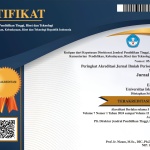Passive Constitutional Rights of Former Convictors in Regional Head Elections (Perspective of Constitutional Court Decision No. 42/PUU- XIII/2015)
Abstract
This study discusses the political rights of former convicts to run as regional head candidates. This article is the result of an analysis of the Constitutional Court's decision No. 42/PUU-XIII/2015 which grants political rights to former convicts to run as regional head candidates. The basis for consideration (ratio decidendi) of the Constitutional Court's decision is; the right to vote and be elected can only be revoked based on a court decision, not based on statutory provisions; a person who has served a sentence and is released from prison is essentially a person who has repented and regrets his actions, so it is not appropriate to be given another punishment through statutory provisions that prohibit running in regional head elections. On that basis, the Constitutional Court grants the right to former convicts to run as regional heads. The Constitutional Court's decision has legal consequences for former convicts who were previously not allowed to run as regional head candidates. After the Constitutional Court's decision, convicts have the same rights to run in regional elections.
Keywords
Full Text:
PDFReferences
Ahmad Mansur, (1989). The Role of Morals in Fostering Legal Awareness, Bandung: Ghalia Indonesia,
Amiruddin and Zamal Maskin, (2004). Introduction to Legal Research Methods, Jakarta: RajaGrafindo Persada,
Arep, Ishak and Hendri Tanjung. (2023). Motivation Management. Publisher PT. Gramedia Widiasarana Indonesia, Jakarta.
Copy of Constitutional Court Decision No. 42/PUU-XIII/2015 Law No. 39 of 1999 concerning Human Rights
Faculty of Sharia and Law Revision Team, (2017). Guidelines for Writing Thesis of the Faculty of Sharia and Law, UIN Sunan Kalijaga I, Yogyakarta: Faculty of Sharia Press,
Gugun Ridho Putra, (2012). The Rights of Former Convicts to be Elected in Regional Head Elections, Thesis of the Faculty of Law, University of Indonesia, Depok,
Jimly Asshiddiqie, (2011). The Constitution and Constitutionalism of Indonesia, 2nd ed., Jakarta: Sinar Grafika,
Kartono, Kartini. (1998). Leaders and Leadership: What is Abnormal Leadership? PT Raja Grafindo Persada, Jakarta.
Mahrus Ali, (2013). Grounding Progressive Law, Yogyakarta: Aswaja Pressindo,
Muhamad Aldy Firdaus and Hananto Widodo, (2017). “Legal Implications of Constitutional Court Decisions on Former Convicts Who Become Regional Head Candidates (Analysis of Constitutional Court Decision Number 42/PUU-XIII/2015)”, Unesa student journal, FISH, Surabaya State University,
Muhammad Iqbal, (2014). Fiqh Siyasah: Contextualization of Islamic Political Doctrine, Jakarta: Prenadamedia Group,
Musyafiatun, (2014). “Nomination of Former Convicts as Legislative Members from the Perspective of Fiqh Siyasah”, Al- Daulah: Journal of Islamic Law and Legislation Vol. 4, No. 2, October
Satjipto Rahardjo, (2004). The King of Law; Search, Liberation and Enlightenment, Surakarta: Muhammadiyah Press University,
Satjipto Rahardjo, (2007). Dissecting Progressive Law, Jakarta: Kompas,
Satjipto Rahardjo, (2009). Progressive Law: A Synthesis of Indonesian Law, Yogyakarta: Genta Publishing,
Soerjono Soekanto & Sri Mamudji, (2001). Normative Legal Research (A Brief Review), Jakarta: Rajawali Pers,
Sugiyono, (2017). Quantitative, Qualitative, and R&D Research Methods. Bandung: CV. Alfabeta,
Suradinata, Ermaya. (1995). Employee Psychology and the Role of Leadership in Work Motivation. CV Ramadan, Bandung.
Suyuthi Pulungan, (1994). Fiqh Siyasah: Teachings, History and Thought, 1st cet, Jakarta: Persada.
DOI: https://dx.doi.org/10.30659/jdh.v8i2.44927
Refbacks
- There are currently no refbacks.
View My Stats

This work is licensed under a Creative Commons Attribution 4.0 International License.
Jurnal Daulat Hukum has been indexed in:

